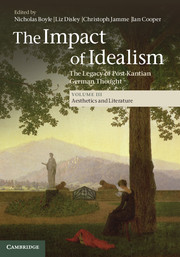Book contents
- Frontmatter
- Contents
- List of Illustrations
- List of Contributors
- Acknowledgements
- List of Abbreviations
- Introduction: Idealism in aesthetics and literature
- 1 The legacy of Idealism and the rise of academic aesthetics
- 2 Hegel's philosophical theory of action: the concept of action in Hegel's practical philosophy and aesthetics
- 3 Tragedy and the human image: German Idealism's legacy for theory and practice
- 4 Romanticism as literary Idealism, or: a 200-year-old way of talking about literature
- 5 Idealism in nineteenth-century German literature
- 6 Idealism in nineteenth-century British and American literature
- 7 Elements of Schopenhauer's thought in Beckett
- 8 German Idealism and the philosophy of music
- 9 The music of German Idealism
- 10 ‘Refiner of all human relations’: Karl Friedrich Schinkel as an Idealist theorist
- 11 Influences of German Idealism on nineteenth-century architectural theory: Schelling and Leo von Klenze
- 12 ‘Making a world’: the impact of Idealism on museum formation in mid-nineteenth-century Massachusetts
- 13 Hegel, Danto and the ‘end of art’
- Bibliography
- Index
- References
2 - Hegel's philosophical theory of action: the concept of action in Hegel's practical philosophy and aesthetics
Published online by Cambridge University Press: 05 December 2013
- Frontmatter
- Contents
- List of Illustrations
- List of Contributors
- Acknowledgements
- List of Abbreviations
- Introduction: Idealism in aesthetics and literature
- 1 The legacy of Idealism and the rise of academic aesthetics
- 2 Hegel's philosophical theory of action: the concept of action in Hegel's practical philosophy and aesthetics
- 3 Tragedy and the human image: German Idealism's legacy for theory and practice
- 4 Romanticism as literary Idealism, or: a 200-year-old way of talking about literature
- 5 Idealism in nineteenth-century German literature
- 6 Idealism in nineteenth-century British and American literature
- 7 Elements of Schopenhauer's thought in Beckett
- 8 German Idealism and the philosophy of music
- 9 The music of German Idealism
- 10 ‘Refiner of all human relations’: Karl Friedrich Schinkel as an Idealist theorist
- 11 Influences of German Idealism on nineteenth-century architectural theory: Schelling and Leo von Klenze
- 12 ‘Making a world’: the impact of Idealism on museum formation in mid-nineteenth-century Massachusetts
- 13 Hegel, Danto and the ‘end of art’
- Bibliography
- Index
- References
Summary
It may seem presumptuous to enter a plea on behalf of Hegel as part of a network centred in Cambridge, a city so strongly associated with the name of Wittgenstein. And I hope that Wittgenstein may forgive me if, provocatively enough, I go even further and offer the following remarks as a direct contribution to the current ‘Hegelian Turn’, understood in terms of Robert Pippin's claim for Idealism as Modernism. I should like to demonstrate the far-reaching significance of German Idealism – the Impact of Idealism – by indicating the contemporary relevance of Hegel's theory of action, and for this purpose I shall focus on two specific examples: (a) Hegel's philosophical conception of punishment as one of the foundations of contemporary legal penal theories; and (b) the modern character of the precise distinction between ‘deed’ and ‘act’ and its significance for contemporary theories of action.
Although it hardly seems disputed today that Hegel's practical philosophy is essentially be understood as a philosophical theory of action (in this connection Robert Pippin speaks of a ‘rational agency theory of freedom’, and Michael Quante of a ‘critical theory of action’), there are only a few extensive and illuminating discussions of this question. In the Outlines of the Philosophy of Right, Hegel's principal contribution to ‘the practical domain’, the philosopher unfolds the concept of action on three levels, developed in relation to the acting subject in each case. This sequence of levels embraces in turn: (a) the formal-juridical behaviour of the agent qua ‘person’; (b) the action of the moral subject; and (c) the action of the ethical subject. On the one hand, Hegel's Philosophy of Right also develops the concept of action by reference to an interpretation of specific works of art, an approach which helps to define this concept more sharply in the context of practical philosophy, and contributes to a more precise analysis of the components, types and forms of action and of conflictual behaviour as well.
- Type
- Chapter
- Information
- The Impact of IdealismThe Legacy of Post-Kantian German Thought, pp. 23 - 45Publisher: Cambridge University PressPrint publication year: 2013



